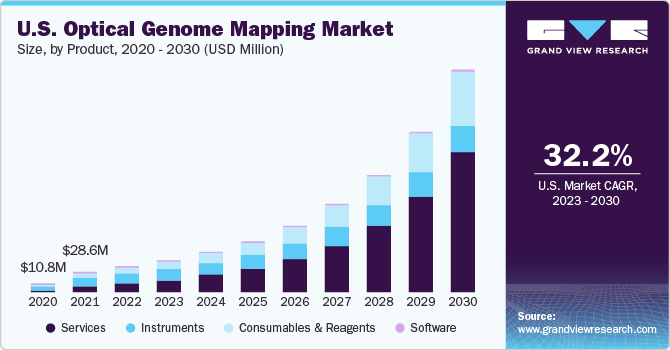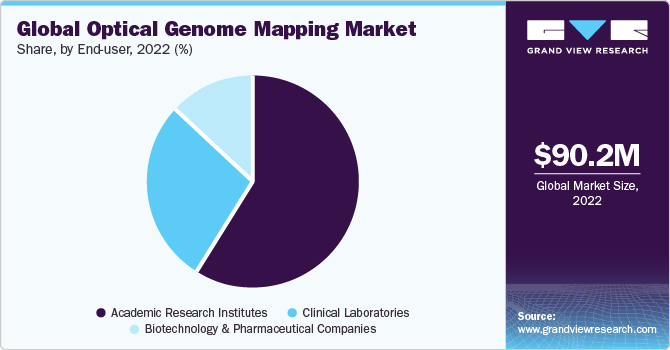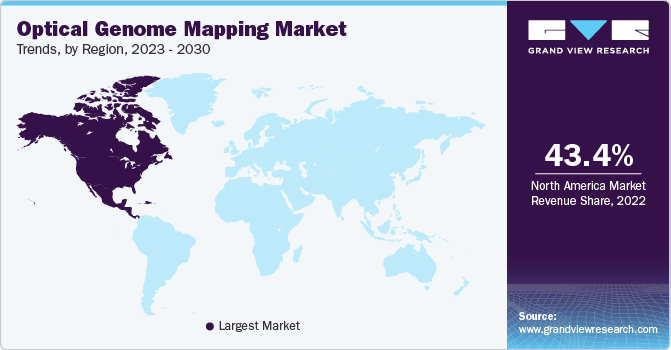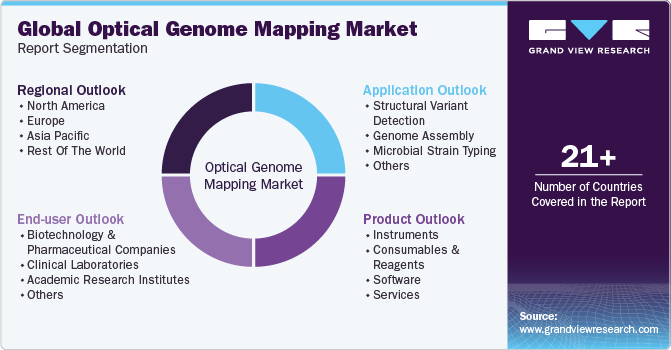
Optical Genome Mapping Market Size, Share & Trends Analysis Report, By Product (Instruments, Software), By Application (Structural Variant Detection, Genome Assembly), By End-user, By Region, And Segment Forecasts, 2023 - 2030
- Report ID: GVR-4-68040-133-3
- Number of Pages: 150
- Format: Electronic (PDF)
- Historical Range: 2018 - 2021
- Industry:Healthcare
Optical Genome MappingMarket Size & Trends
The globaloptical genome mapping market sizewas estimated atUSD 90.2 million in 2022and is projected to grow at a compound annual growth rate (CAGR) of 29.1% from 2023 to 2030. The market has witnessed substantial growth in recent years, primarily driven by the increasing demand for advanced genomic analysis tools and techniques. Optical genomic mapping offers researchers and clinicians a powerful method for studying structural variations in the genome, thereby enhancing their understanding of genetic diseases, and facilitatingpersonalized medicine.

The COVID-19 pandemic has had a positive impact on the optical genome mapping industry. The market faced disruptions in the early stages of the pandemic as laboratories and research institutions worldwide had to divert their resources and focus towards COVID-19 diagnostics, treatment, and vaccine development. This led to a temporary slowdown in non-COVID-related research activities, includinggenomics. Supply chain disruptions and lockdown measures hampered the production and distribution of optical mapping equipment and consumables, causing delays in ongoing projects and new installations.
As the pandemic progressed, optical genome mapping technology demonstrated its relevance in addressing COVID-19-related challenges. Researchers turned the focus on optical mapping to study the genetic variations of the SARS-CoV-2 virus, understand its transmission dynamics, and track mutations that could impact vaccine efficacy. OGM's ability to provide rapid and high-resolution genomic data became valuable for identifying and monitoring emerging variants of the virus, contributing to the global response to the pandemic. As genomics continues to play a crucial role in understanding and addressing infectious diseases, including COVID-19, the optical genome mapping industry is likely to recover and expand in the long term.
The continuous advancements in optical mapping technologies have played a pivotal role in market expansion. Innovations in high-resolution imaging, DNA labeling, and data analysis algorithms have improved the accuracy and efficiency of optical genome mapping, making it an attractive choice for a wide range of applications, including genome assembly, structural variant detection, andgenotyping. For instance, in January 2023, Bionano Genomics announced the launch of several new products and advancements for its optical genome mapping workflow, including improved sample preparation robustness, faster turnaround time for DNA labeling and imaging, and increased throughput and quality metrics. Bionano's new sample prep kits, chips, and instrument software respond to customer feedback and can increase performance in a greater volume of routine genome analysis applications.
The growing adoption of optical genome mapping in research institutions and pharmaceutical companies contributed to market growth. For instance, in July 2023, the Centre for Cellular & Molecular Biology (CCMB) in Hyderabad, India launched a cutting-edge high-end next-generation genetic testing tool called 'Optical Genome Mapping' (OGM) that may discover genomic anomalies causing a variety of hereditary diseases in humans. As the importance of genomics in drug discovery and development continues to rise, the demand for precise and reliable genomic analysis tools like optical mapping is expected to surge further.
Product Insights
In terms of product, the market is segmented into instruments, consumables and reagents, software, and services. The services segment dominated the market with the largest revenue share of 39.1% in 2022.An increasing number of outsourced service vendors is expected to maintain the demand for services over the forecast period. The optical genome mapping (OGM) industry is thriving due to increased demand, ongoing innovation, diverse applications, and its integral role in advancing genomics research and applications. There has been a growing demand for OGM services across various end-users for genomics research and clinical applications. As genomics research continues to advance and new challenges emerge, the demand for advanced OGM services is expected to grow over the forecast period.
The consumables and reagents segment is anticipated to grow with a rapid CAGR from 2023 to 2030. Consumables and reagents make up an essential part of the OGM workflow. These consumables and reagents including DNA extraction kits, labeling kits, buffer solutions, microfluidic chips or flow cells, and others are crucial for preparing, processing, and analyzing genomic samples using OGM technology. As OGM technology is increasingly adopted in genomics research and clinical applications, the demand for the essential materials and chemicals used in the process is expected to surge over the coming years.
Application Insights
Based on application, the market is segmented into structural variant detection, genome assembly, microbial strain typing, and others. The structural variant detection segment dominated the market with a revenue share of 49.2% in 2022 and is expected to grow at a lucrative CAGR from 2023 - 2030. Structural variants (SVs) are large-scale genomic alterations that can have a profound impact on an individual's health, including their susceptibility to genetic diseases and their response to treatments.
Optical genome mapping's high-resolution imaging capabilities and ability to analyze individual DNA molecules make it exceptionally well-suited for the detection of structural variants. According to a study published by Springer Nature Limited in March 2021, the total count of SVs discovered per genome has increased from 2, 1-2, 5k in the 1000 genomes project to more than 27k in 2021 multi-platform sequencing efforts. Recent contributions from the Pan-Cancer Analysis of Whole Genomes (PCAWG) Consortium offered a substantial supply of matched tumor-normal genomes. The findings from multi-platform analyses also reveal present SV gaps in cancer variant databases such as COSMIC. However, the increasing research on large-scale genome identification is expected to drive market growth over the forecast period.
The genome assembly segment is anticipated to register the fastest CAGR of 33.8% over the forecast period. Genome assembly involves piecing together the entire DNA sequence of an organism, which is a complex and intricate process. OGM has emerged as a transformative technology for genome assembly due to its ability to provide high-resolution, long-range structural information about DNA molecules. This precise structural data helps researchers overcome challenges associated with repetitive and complex genomic regions that often confound traditional sequencing methods. As the genomics field continues to expand, the genome assembly application segment is poised for further growth and innovation.
End-user Insights
Based on end-user, the market is segmented into biotechnology and pharmaceutical companies, clinical laboratories, academic research institutes, and others. The academic research institutes segment dominated the market with a revenue share of 59.1% in 2022. These institutions have increasingly adopted OGM technologies to advance their genomics research efforts. Researchers in fields such as genetics, molecular biology, and biotechnology are continually seeking tools and techniques that can provide a more comprehensive understanding of genomes. For instance, in April 2021, at the American College of Medical Genetics and Genomics, the annual clinical genetics meeting at Columbia University Medical Center (CUMC), highlighted the importance of OGM technology compared to traditional routine methods. The OGM revealed 100 percent concordance in a study of 100 Acute Myeloid Leukemia (AML) patients. Such factors can likely drive the segment growth over the coming years.

The hospitals and clinical laboratories segment is anticipated to register a lucrative CAGR over the forecast period. These hospitals and clinical laboratories have recognized the immense potential of optical mapping technology in advancing drug discovery, research, andprecision medicineinitiatives. The increasing number of collaborations between instrument manufacturers and these hospitals is expected to drive the segment growth over the forecast period. For instance, in March 2023, Bionano announced that it would be participating in the annual meeting of the American College of Medical Genetics and Genomics to showcase applications of OGM for rare genetic disorders and constitutional disorders.
Regional Insights
Based on region, North America dominated the market in 2022 with a revenue share of 43.4%. This region has been at the forefront of genomics research and biotechnology advancements, and OGM has played a pivotal role in this landscape. The market's growth can be attributed to several key factors, including a strong presence of leading biotechnology and pharmaceutical companies, extensive government funding for genomics research, and a robust healthcare infrastructure. For instance, in September 2019, the National Institute of Health, granted USD 29.5 million to create and maintain the most comprehensive human genome reference sequence. The rising prevalence of genetic diseases and the increasing demand for personalized medicine have fueled the adoption of OGM technologies in clinical applications.

欧洲lucra有望增长tive CAGR over the forecast period. Factors such as the increasing focus of market players on developing nations such as Germany and the UK are expected to drive the demand for OGM within the region. An increasing number of accreditations by hospitals for the use of OGM is expected to fuel the segment growth. For instance, in the year 2021, University Hospitals Leuven in Belgium got an accreditation from the Belgian Accreditation Body to use OGM to study Acute Lymphoblastic Leukemia. Such developments are expected to drive regional market growth.
Key Companies & Market Share Insights
The key participants in the market are implementing various strategic initiatives including technological advancements, mergers and acquisitions, and collaborations to retain their market presence. In addition, numerous strategic initiatives help market participants to strengthen their industry position. For instance, in March 2023, Bionano Genomics launched two novel OGM-based clinical tests, OGM-Dx prenatal whole genome structural variant and OGM-Dx postnatal whole genome structural variant. These tests provide a genome-wide evaluation of structural variants as well as testing for the most prevalent and unusual chromosomal abnormalities to help clinicians diagnose and manage their patients' medical issues. In addition, in November 2022, Bionano Genomics acquired Purigen Biosystems, Inc. to enable improved and enhanced DNA separation for OGM and identify difficult sample types in new applications with Isotachophoresis (ITP) on the ionic purification system. Some key players in the global optical genome mapping market include:
Bionano Genomics
Nucleome Informatics Private Limited
Praxis Genomics, LLC,
SourceBio International Limited (Source BioScience)
MedGenome
INRAE (French Plant Genomic Resources Center (CNRGV))
PerkinElmer (PerkinElmer Genomics)
Genohub Inc.
Hofkens Lab
Cerba
Optical Genome Mapping MarketReport Scope
Report Attribute |
Details |
Market size value in 2023 |
USD 109.7 million |
Revenue forecast in 2030 |
USD 656.2 million |
Growth rate |
CAGR of 29.1% from 2023 to 2030 |
Base year for estimation |
2022 |
Historical data |
2018 - 2021 |
Forecast period |
2023 - 2030 |
Quantitative units |
Revenue in USD million, CAGR from 2023 to 2030 |
Report coverage |
Revenue forecast, company ranking, competitive landscape, growth factors, and trends |
Segments covered |
Product, application, end-user, region |
Regional scope |
North America; Europe; Asia Pacific; Rest of the World |
Country scope |
U.S.; Canada; Germany; UK; France; Italy; Spain; Japan; China; South Korea; Singapore; Australia India; Brazil; Mexico; South Africa |
Key companies profiled |
Bionano Genomics; Nucleome Informatics Private Limited; Praxis Genomics, LLC; SourceBio International Limited (Source BioScience); MedGenome; INRAE (French Plant Genomic Resources Center (CNRGV)); PerkinElmer (PerkinElmer Genomics); Genohub Inc.; Hofkens Lab; Cerba |
Customization scope |
Free report customization (equivalent up to 8 analyst’s working days) with purchase. Addition or alteration to country, regional & segment scope. |
革命制度党cing and purchase options |
Avail customized purchase options to meet your exact research needs.Explore purchase options |
Global Optical Genome Mapping Market Report Segmentation
This report forecasts revenue growth and provides an analysis on the latest trends in each of the sub-segments from 2018 to 2030. For this report, Grand View Research has segmented the global optical genome mapping market report based on product, application, end-user, and region:

Product Outlook (Revenue, USD Million, 2018 - 2030)
Instruments
Consumables and Reagents
Software
Services
ApplicationOutlook (Revenue, USD Million, 2018 - 2030)
Structural Variant Detection
Genome Assembly
微生物圣rain Typing
Others
End-user Outlook (Revenue, USD Million, 2018 - 2030)
Biotechnology and Pharmaceutical Companies
Clinical Laboratories
Academic research institutes
Others
RegionalOutlook (Revenue, USD Million, 2018 - 2030)
North America
U.S.
Canada
Europe
Germany
UK
France
Italy
Spain
Asia Pacific
Japan
China
South Korea
Singapore
Australia
India
Rest of the World
Brazil
Mexico
South Africa
Frequently Asked Questions About This Report
b.The global optical genome mapping market size was estimated at USD 90.2 million in 2022 and is expected to reach USD 109.7 million in 2023.
b.The global optical genome mapping market is expected to grow at a compound annual growth rate of 29.1% from 2023 to 2030 to reach USD 656.2 million by 2030.
b.North America dominated the optical genome mapping market with a share of 43.4% in 2022. This is attributable to the rising number of research studies being done within research institutes and academic institutions
b.Some key players operating in the optical genome mapping market include Bionano Genomics; Nucleome Informatics Private Limited; Praxis Genomics, LLC; SourceBio International Limited (Source BioScience); MedGenome; INRAE (French Plant Genomic Resources Center (CNRGV)); PerkinElmer (PerkinElmer Genomics); Genohub Inc.; Hofkens Lab; Cerba
b.Key factors that are driving the market growth include advancement in genomics research and rising government spending on research grants
We are committed towards customer satisfaction, and quality service.
"The quality of research they have done for us has been excellent."






